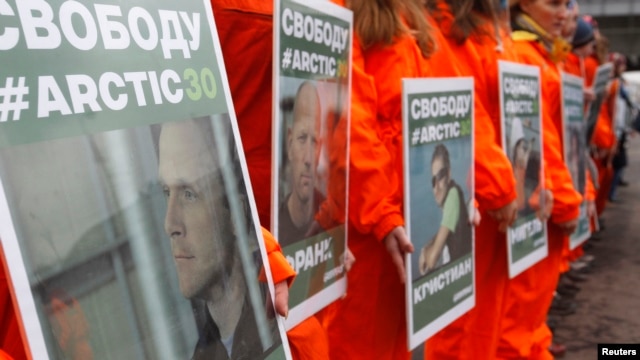
FILE - Greenpeace activists hold portraits of those detained on the boat Arctic Sunrise during a rally in Moscow, Russia.
MOSCOW — Russian is to press additional charges against several Greenpeace activists who were arrested for a protest at the country's first offshore Arctic oil rig, investigators said on Thursday.
Russia has drawn international criticism over the arrest and subsequent treatment of the 30 people on board the Greenpeace ship Arctic Sunrise when activists tried to scale the Gazprom-owned Prirazlomnaya oil platform.
Russian investigators initially charged all 30 with piracy but said last month they were changing the charge to hooliganism, cutting the maximum jail sentence they face to seven years from 15 years.
But Vladimir Markin, a spokesman for a state investigative team which reports directly to Russian President Vladimir Putin, said some of the activists, in addition to being charged with hooliganism, will face charges of resisting law officers, which would carry a maximum five year-prison sentence.
“A few boats approached the platform, and with the aid of special equipment, they tried to climb up the platform. They completely ignored the authorities' orders. Furthermore, if you recall, they rammed the coastguard ship,” Markin said in an interview on Internet news site gazeta.ru.
Greenpeace has always said its protest was entirely peaceful.
Markin's comments came after British Prime Minister David Cameron gave an interview on Thursday urging Putin to help free the Greenpeace activists, saying the action taken against them was “excessive”.
Cameron said he welcomed a decision to reduce the charges against the protesters to hooliganism from piracy, but still felt the action went too far.
“They are not hooligans, they are protesters,” Cameron told BBC local radio, according to a transcript released by his spokesman.
“I totally understand that countries have to have some quite tough rules to stop people invading oil platforms, but I have appealed to Vladimir Putin to try to de-escalate this and make sure that these people can go home.”
Rights violated
Russian authorities have held the 28 activists and two freelance journalists, as well as the Dutch-registered Arctic Sunrise, in the Arctic city of Murmansk.
Greenpeace said last week officials were preparing to move the prisoners to St Petersburg where they have more chance of being visited by family and lawyers after well over a month in jail.
The Netherlands has asked the International Tribunal for the Law of the Sea in Hamburg to order Russia to release the ship and all those detained.
Russia has said it does not recognize the case, accusing the activists and their ship of posing a security threat.
A Dutch government representative said Russia had “violated the human rights” of the activists who tried to climb onto Russia's first offshore Arctic oil rig in September, detaining them for seven weeks “without grounds”.
After the protest, Russian coastguard officers boarded and seized control of the ship and towed it to Murmansk. Russia has rejected Greenpeace's assertions that the ship had been in international waters when it was seized.
Strains between the Netherlands and Russia over the Greenpeace protest are in danger of overshadowing the arrival of Dutch King Willem-Alexander and Queen Maxima to Moscow on Friday to mark 400 years of diplomatic ties between the two countries.
Greenpeace activists said their protest was aimed at raising awareness about the risks that Arctic offshore oil drilling posed to thousands of kilometers of coastal areas.
The head of Greenpeace Kumi Naidoo offered on Wednesday to move to Russia and stand as security for the release on bail of the 30.
|
|
